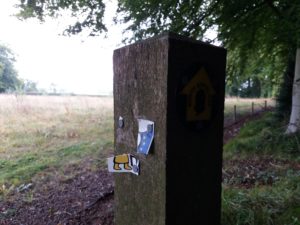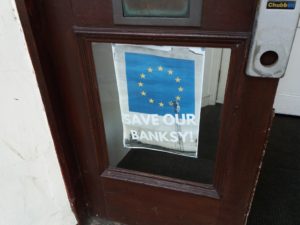I’ve walked hundreds of miles on British trails this year; and I keep on thinking about Brexit.
I’ve spoken about the connections between walking and politics in my recent post on Teresa May. While my walks had no explicit connection with politics, I often thought about the coming changes.
Last year, walking the South Downs Way, it was a few months after the referendum. I was sure that nobody would be stupid to trigger article 50 without a plan, and any sort of plan was obviously some way off. It was still not clear what the simplistic question in the referendum actually meant – beyond ‘Brexit means Brexit’.
Then, in March this year, Article 50 was enacted and Britain is set to leave the EU. Months have passed and we’re no nearer knowing what that means, despite having a hard deadline of March 2019. Whatever happens, it looks like the country has a tough time ahead.
This Summer has had a feeling of pre-emptive nostalgia. As if right now might be as good as it gets for Britain in my lifetime. The banks are preparing to fly from the financial towers of London to Frankfurt and Dublin and Paris. Numbers of foreign workers are falling, despite the importance of imported labour for various part of the economy, like the fruit farms we strolled last weekend. After six months, little progress has been made on the negotiations. Project Fear was the wrong way to argue against Brexit, but I suspect it was closer to the truth than the sunlit uplands we were promised. Sovereignty is all very well, but it doesn’t help people pay their mortgages.
I’m a patriot about Britain. Just like Daniel Hannan and Teresa May, I love walking in the English countryside. I’m not proud of being British – it is just a coincidence, nothing to do with me. But I do like it – and hiking in Britain would be much more difficult in the future if I was European but not British.
My hiking has taken me through areas that voted both leave and remain. Everyone is friendly, but there is a tension growing. People who still want to remain in the EU have been called traitors by the mainstream press. Meanwhile, I’m about to lose a lot of rights I was born with. I am about to be dragged into a country I don’t really know. (I saw a ‘remainer’ told that, if they liked Europe so much, they should go and live there; they already do).
There is no real opposition to Brexit at the moment. Apart from tarnished Tony Blair, nobody has put forward a serious rallying cry for stopping Brexit, despite the numbers who are angry and confused by it. Simon Indelicate writes about the rift in his essay Which People Have Spoken? – “It will never, ever, be OK. Something has broken between us.” If Brexit does not go very well, there will always be a simmering resentment.
Walking the Pennine Way, I stayed at a peaceful B&B. Over breakfast, the conversation turned to Brexit. I had been avoiding the subject, as I didn’t want the confrontation. Why spoil the holiday? But the host bought it up, she told us how eastern Europeans were laughing at us, explaining how people from one nation spent their welfare money on drink at the weekends, and on Monday demanded nappies from the state. My companion had voted leave, but was also strongly in favour of EU immigration. He had often employed such nationals, seeing them as hard workers, and his business relied on them.
I stayed polite as I objected, but I know that these conversations will become more difficult, less patient. I’m not sure how easy it will be to tolerate each other if things go wrong. If Brexit is a success, we can all laugh at how foolish the remoaners and the traitors were. If it doesn’t work out, then there is nothing to make up for the things being stolen from the people who voted to remain.
I walked another part of the Pennine Way during the run-up to the May election. There seemed little sign of that in the countryside – unlike the referendum, where farmers would put out signs in their fields. Maybe we saw few traces of the election because we were walking through safe seats (although, it turns out, not as safe as first thought). Or maybe it was because the election was irrelevant. The referendum overrules representational democracy, and parliament has become subservient to it; a narrow victory in a non-binding vote is now being taken for a permanent mandate. The return of sovereignty seems to involve Parliament being removed from the constitutional process.
“It will never, ever, be OK.” Last weekend, on the North Downs Way, we followed part of Watling Street, the subject of John Higgs’ recent book. We found ourselves at one end of the road while, coincidentally, Mr. Higgs was at the other end in Anglesey. John wrote his book in the summer just after the referendum, when the questions of nationality were first stirred up. John looks at the different ways of being British, and his vision is a wide, inclusive one – nationality, he says, “only exists at a distance”.
In the book, John refers to Pierre Teilhard de Chardin’s theory of the noosphere, the world of human thought. This is the highest in a hierarchy of spheres, from the geosphere of rock and ocean, through the biosphere, the world of living things. They interact, but change at different speeds. In some places, the noosphere has altered the geosphere, like the Uffington horse or the stones at Avebury.
Hiking has given me a feel for the British geosphere that I never had before. Much of that will remain unchanged by what’s coming. The geosphere, the rock and damp that created the first ideas of Britishness, that will ensure. But the noosphere is in a mess, a tangle of broken ideas. It may never be OK again in my lifetime.
I find myself wondering if it is time to leave the UK. I want to stay, because this was my home; but it’s feeling less and less like home. The metric weights and European nature that were part of my Britain are being removed. I want to stay, but I feel unwelcome.
Between my two most recent hikes I went to Dublin on business. The city is booming and preparing for more growth after Brexit. From what I read, so are Frankfurt and Paris. There will be jobs there for British people after Brexit. I don’t know if I want to stay in this country, rather I might be better to treat it as a holiday destination. A place to go hiking.
These are the sorts of thoughts I consider while hiking. I’m sure Daniel Hannan has equally profound thoughts on the English hills. While mine are all over the place, I have some very particular things to discuss in detail next month, as part of The Indelicate’s October Ritual event (which also features John Higgs). Beyond my personal feelings, there are some deep links between hiking and Brexit.

